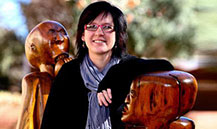 |
Elrie Joubert
Photo: Hannes Pieterse
24 July 2012 |
A former Kovsie has taken top honours at the Absa L’Atelier Art Competition.
Elrie Joubert, who completed her master’s degree at the Department of Fine Arts in 2010, is the first Free Stater who has won the competition for young artists between 21 and 35. This puts her in the company of previous winners such as Penny Siopis and Diane Victor. As the overall winner, Joubert receives a cash prize of R110 000 and a six month stay at the Cité Internationale des Arts in Paris, France.
Her winning entry, Selective Unveiling, consists of a light-table with a private collection of miniature natural objects, a digital microscope used by the viewer to inspect the objects, as well as a projector that projects the microscope’s image directly on a screen.
“By making my private collection public, I expose myself to possible investigation and criticism,” says Joubert about her winning entry. “The process is, however, reversed when the viewer is also robbed of his/her ‘privacy’ in collecting images with the microscope, which are projected on a screen for other viewers to see.”
Joubert, who lectures in Drawing and History of Art of Graphic Design at the Midrand Graduate Institute’s Bloemfontein Campus, says the Absa L’Atelier is the biggest competition she has won thus far. In 2007 and 2010 she reached the final rounds of the SASOL New Signatures Art Competition.
Her advice to art students: “Keep on doing what you do, learn to handle criticism selectively, and above all, if you take no risks you’ll never win.”